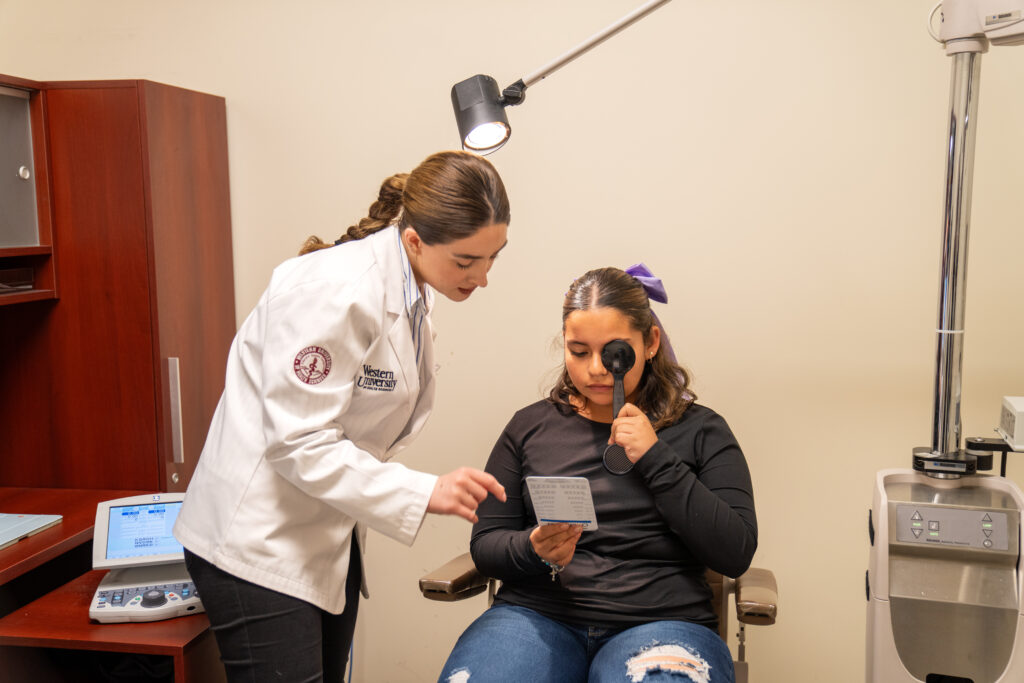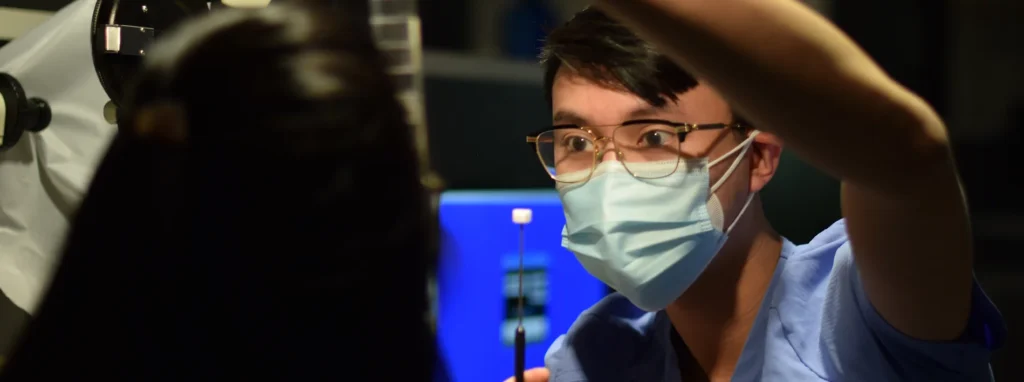4 US universities offering impactful degrees for future optometrists

At least 2.2 billion people in the world are visually impaired. Refractive errors and cataracts are known to be the two main leading causes of vision impairment and blindness. And the sad thing is, one billion of them could have been prevented.
That is why the world is in dire need of more optometrists. Optometrists do not just examine the eyes for problems or provide care to maintain and restore a person’s eyesight. They are also some of the first people to spot life-threatening conditions like diabetes, high blood pressure, high cholesterol, and even tumors, all just by looking at someone’s eyes.
As our population ages, the need for eye care is anticipated to rise even more and significantly — making now the best time to consider a career in optometry.

Programs at Western University of Health Sciences are designed to provide students with clinical skills that promote patient-centered care and collaboration. Source: Western University of Health Sciences
Western University of Health Sciences
The best form of healthcare incorporates scientific excellence and a compassionate approach towards patients. That is what you will discover and learn about at Western University of Health Sciences. For over 45 years, the university has provided education centered around a humanistic approach – best exemplified at the College of Optometry.
Programs here are designed to provide students with clinical skills that promote patient-centered care and collaboration. The Doctor of Optometry (OD) emphasizes optometric rehabilitation including neuro-optometry, vision therapy, low vision rehabilitation, and developmental disabilities. With the help of educators, faculty members, and advanced technologies found in laboratories, you will have hands-on clinical experience that not only arm you with technical know-how but also the soft skills needed to succeed in this field. You will gain a high level of self-awareness and maturity, a good understanding of the profession, excellent verbal and interpersonal communication skills, and a commitment to compassionate healthcare.
Students also have the chance to participate in one of the largest interprofessional practice and Education (IPE) programs in the country in terms of class size and the number of health professionals joining. This occurs when students from different professions learn about, from, and with each other to enable effective collaboration and improve health outcomes. This team-based practice will prepare them to enter the workplace, where clinicians work together for the benefit of their patients.
Whether you choose to work in a private or group practice, public hospitals, community clinics, or any other setting, the full set of knowledge and skills gained from your OD will set you up for a rewarding career helping people improve their vision, maintain, and restore their eye health.
Located in Southern California, the university gives back to the local community by providing specialized services. This is when College of Optometry students get to apply their theoretical knowledge to practice and gain invaluable experience, knowing that they have directly impacted their community positively. Apply to the College of Optometry at Western University of Health Sciences today.

The university’s optometry programme takes place in two colleges which are Arizona College of Optometry and Chicago College of Optometry. Source: Midwestern University/Facebook
Midwestern University
Midwestern University offers programs that give you a solid footing in the field of healthcare through extensive hands-on work and a compassionate perspective toward your future patients. The university also provides interprofessional education where you will learn alongside students from other health professions, mirroring the diversity in professional settings.
The Doctor of Optometry program takes place in two colleges: Arizona College of Optometry and Chicago College of Optometry, both spanning four years. At the Arizona College of Optometry, students will learn more about health sciences, optics, and anatomy in the first year to give a strong foundation in the overall field. The second and third years introduce ocular disease, vision sciences, and specialty services. During the second year, students will start their part-time clinical service which will then become a full-time required curriculum come the fourth year.
At the Chicago College of Optometry, students will receive a similar foundational curriculum in the first and second years too but with exposure to clinical practice through simulations and introductory courses. The programme emphasizes more on diagnosis and treatment of ocular dysfunction and disease during the third year. The last year will see them in clinical training that will include some on and off campus externship rotations.

Students will have the chance to apply theories learned practically at the Illinois Eye Institute as early as in their first year. Source: Illinois College of Optometry/Facebook
Illinois College of Optometry
Since its establishment in 1872, the Illinois College of Optometry has offered world-class education to students by partnering with patients in one of Chicago’s vulnerable communities, ensuring a practical approach to its teaching methods. Courses here are divided into six tracks where students will cover all in the span of four years.
The Biomedical and Vision Sciences program provides basic science knowledge to refresh your understanding of the visual system. This covers anatomy, physiology, optics, and vision science. Primary Optometric Practice teaches the skills that you need when conducting an eye examination. Specialty Optometric Practice focuses on eye examination skills in specialty areas like contact lenses, pediatrics, and vision rehabilitation.
Ocular Disease will touch on ocular and systemic diseases that are needed to adequately care for patients. During Patient Care, students will rotate through various clinical departments which include Primary Care, Eyewear Centre, Contact Lens, Vision Rehabilitation, Paediatrics/Binocular Vision, Advanced Care, and Urgent Care. Finally, Practice Management Ethics will explore the professional ethics, financial components, and administrative requirements necessary for the practice of optometry and office management.
In addition to the extensive courses, students will have the chance to apply theories learned practically as early as the first year. This is done at the Illinois Eye Institute where you will treat real-life patients as an OD. No two patients are the same at the institute, as you go through new cases every day, from basic eyecare to rare diseases.

Courses at the School of Optometry at Indiana University revolve around topics in vision science, optics, biology, disease, genetics, and physiology-pharmacology. Source: Indiana University/Facebook
Indiana University
Since 1820, Indiana University has always been focused on building a better future for the healthcare industry. This is evident at its School of Optometry where training future generations of eye health experts is made a priority while simultaneously advancing the field of vision. This is all done through comprehensive education and research on eye health.
The school’s Doctor of Optometry program spans four years and includes clinical and practical facets of optometry, as well as the theoretical and fundamental aspects of vision science. Courses here revolve around topics in vision science, optics, biology, disease, genetics, and physiology-pharmacology.
OD students will be exposed to practical work very early on in the program. During your first semester, you will learn how to perform an eye exam which will lead to working alongside top doctors in primary care and specialty services. Eventually, you will start examining patients all by yourself and be able to explain the full spectrum of conditions thoroughly from cataracts to diabetes.
The school implements IPE to develop a collaborative environment between optometry students and other future professionals in different fields. What’s more, students here also get to work with other universities to share ideas and come up with the best possible outcome for the betterment of health care. These universities include Butler University, Purdue University, Ball State University, St. Marys of the Woods College, University of Evansville, Manchester University, and University of St. Francis.
*Some of the institutions featured in this article are commercial partners of Study International
link





